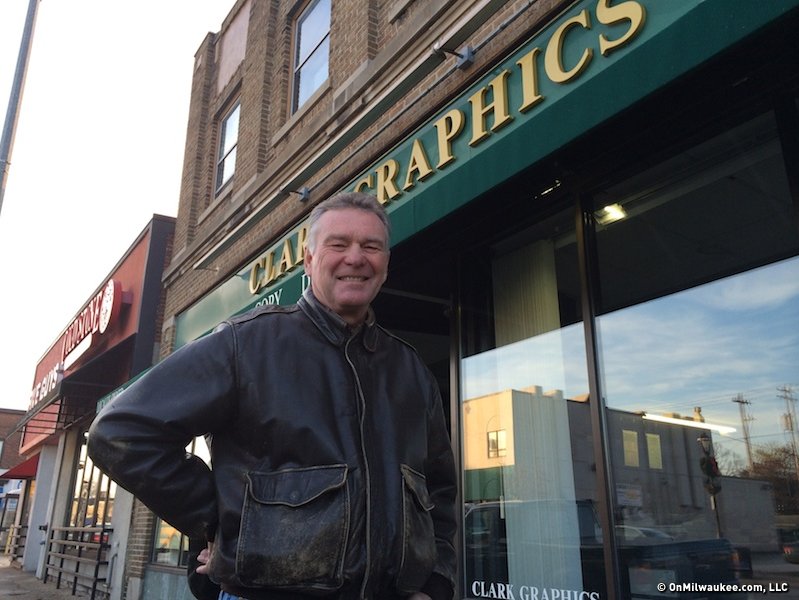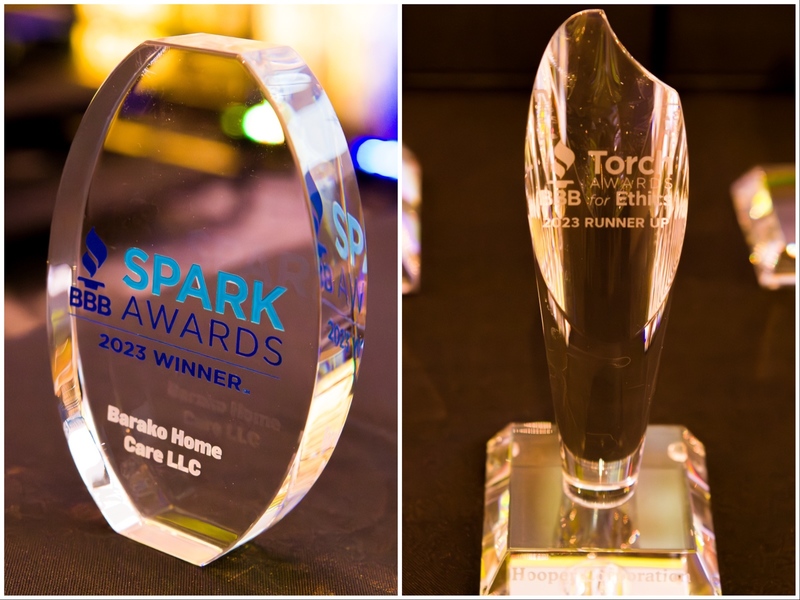When I found out a guy named Clark actually still owned Clark Graphics – the East Side copy shop I’ve been going to since the ‘80s – I was surprised. I presumed the business would have been sold to a larger company by now.
"I usually tell people my last name is ‘Graphics’ but it’s actually Kaufmann," says owner Clark Kaufmann.
Over the years, I heard Kaufmann was a former Kinko’s employee but this, however, is not true. In fact, Kaufmann had no experience with printing or copying when he purchased his first printing press.
"It was my brother’s idea. He said ‘let’s get into the printing business’ and I said ‘we know nothing about the printing business’ and he said ‘we can figure it out,’" says Kaufmann.
Kaufmann grew up in Plymouth, graduated from the University of Wisconsin Green Bay in 1974 and moved to Milwaukee for a woman whom he married 26 years ago.
In 1982, Kaufmann and his brother bought a press from their hometown and taught themselves how to run it via the owner's manual (too bad YouTube didn’t exist).
"I read ‘the book.’ It took awhile, but we got it," says Kaufmann.
Once they were confident with their skills, the brothers opened up shop in a rented space in the basement of a former Dance Circus studio on 35th and National Avenues. They named the business Clark Graphics. (The corporate name is Multiplex Ink.)
"We started in a dark, dirty basement that had been used by a plumbing business for years," says Kaufmann. "It was quite the experience."
In 1985, Kaufmann moved Clark Graphics to Locust Street in part of the building that now houses Atomic Glass. Kaufmann’s brother opted out of the business at the time. In 1988, Kaufmann moved the business to its current location, 2915 N. Oakland Ave.
In the early days, Clark Graphics printed primarily newsletters, envelopes, letterhead and lots of carbonless forms. With the onset of digital technology, most of the jobs from the early days have moved online. Hence, the business has had to find its niche in other aspects of printing.
"Things have changed quite a bit over the years," says Kaufmann. "At one time, we had four self-serve copy machines that ran all day. Now we have two. The key is staying up with the technology that’s available."
Most of the jobs at Clark Graphics today are copies on the color machines and the over-sized printing of posters, artwork and large photographs. Clark Graphics also runs a fair share of bound course packets for local colleges even though many professors put materials online now.
The color copier premiered 20 years ago and continues to be in demand today. Kaufmann says his first color machine copied seven pages a minute and his current one copies 75 pages in the same amount of time.
"There will always be a need for imaging onto some sort of paper or vinyl. People still use signs and send cards and postcards," says Kaufmann.
Printed materials in today’s business world have a new, almost ironic role – to direct people to web sites. According to Kaufmann, most companies realize it’s better to have a hard copy in someone’s hand rather than sending an email which is easily deleted.
"If you have a flier in your hand, you have to at least glance at it," he says.
Over the years, larger companies inquired if Kaufmann wanted to sell the business.
"I’ve been contacted many times and I’ve thought about it, but I’m not ready to sell it," says Kaufmann, who lives three blocks from the shop.
Kaufmann says the long-term success of his business is his employees. Currently, Clark Graphics employs four full-time and two part-time workers.
"Your business is only as good as the people you have working for you. I’ve been very lucky with my employees. Because they are empowered to make decisions on their own, I think they feel like they are very much a part of running the business," he says.
Manager Corey Mielcarz began working at Clark Graphics 23 years ago. He started out in 1991 as the delivery guy and within seven years was named manager. Longtime employee Kevan Sharp is also a manager.
"The four of us working right now have more than 90 years of collective experience here," says Mielcarz. "It’s a lot of fun to work here. It’s a small town in here to me. I know a lot of our customers, some of whom have been coming in for 20 or 25 years."
For some people, of all different ages, copying is a hobby. These "copy junkies" come in two or more times a week to duplicate newspaper articles, documents, artwork or pages from books.
"We still have a lot of regulars. This is something they do. It’s their thing. And it’s great, as long as they don’t take a bath in our sink," says Mielcarz.
Mielcarz says when he works on a job behind the counter he never reads documents from lawyers and financial institutions, but if he’s copying a menu or a wedding invite, he will occasionally take a glance and once in a while even finds a typo.
"I’ve seen ‘crutch’ for ‘church’ on a wedding invite a couple of times," he says. "People are really appreciative when you point it out before printing."
At the end of the interview I finally asked my one burning question: Do the employees ever photocopy their faces?
"Everyone does it once," says Mielcarz. "The light isn’t as bright on the newer machines as it was on the older ones. Let’s just say the transition from analog to digital makes copying faces with eyes open a lot easier."
Molly Snyder started writing and publishing her work at the age 10, when her community newspaper printed her poem, "The Unicorn.” Since then, she's expanded beyond the subject of mythical creatures and written in many different mediums but, nearest and dearest to her heart, thousands of articles for OnMilwaukee.
Molly is a regular contributor to FOX6 News and numerous radio stations as well as the co-host of "Dandelions: A Podcast For Women.” She's received five Milwaukee Press Club Awards, served as the Pfister Narrator and is the Wisconsin State Fair’s Celebrity Cream Puff Eating Champion of 2019.







